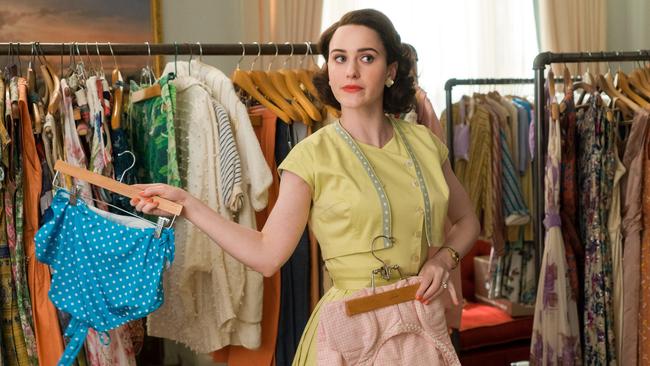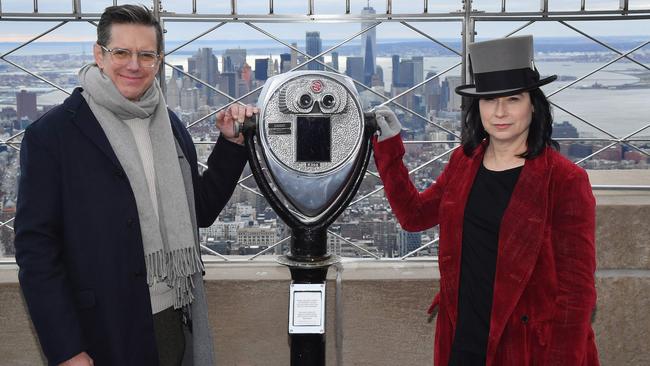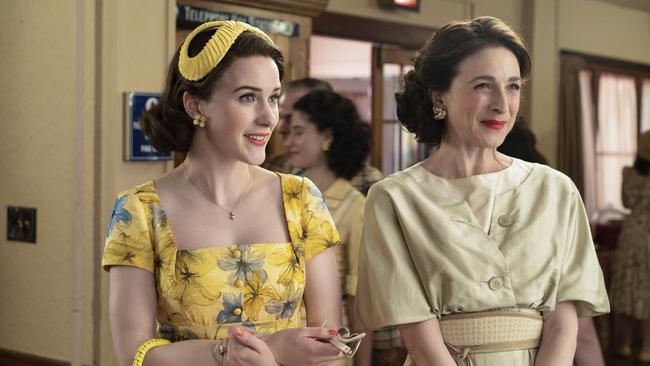Stand-up, take a bow
Neil Fisher talks to the creators of The Marvelous Mrs. Maisel, the unlikely hit about a cheated 1950s housewife turned comedian.

The Marvelous Mrs. Maisel sounds like a superhero and, in a way, she is. It’s just that Midge Maisel’s great act of derring-do comes as the perfect 1950s New York housewife is putting the final touches to her Yom Kippur breakfast (the rabbi has accepted an invitation — serious kudos), when she finds out her husband is leaving her for his secretary.
Midge gets drunk on kosher wine, puts her coat over her nightie, gets on the subway, stumbles into a seedy club in downtown Manhattan — and finds her new metier as a ballsy, brassy stand-up. Mrs Maisel doesn’t fly, she doesn’t have super-strength and she can’t become invisible but, oh my, does she kick comedy ass.
When Amazon Prime put out the pilot of The Marvelous Mrs. Maisel in March last year — one of a raft of tryouts by the streaming service — it was pretty clear that the one with the Yom Kippur meltdown was the keeper. The show duly had its first full season late last year. The Times TV critic Carol Midgley called it “the opposite of gloomy” and in wet November it felt like comedy manna from heaven. It is, say the show’s married creators, Amy Sherman-Palladino and Dan Palladino, “our biggest labour of love”.
They have been rewarded for it. Mrs. Maisel won big at the Emmys this year, taking five awards, including gongs for the former House of Cards actress Rachel Brosnahan, who plays Midge Maisel, and for Alex Borstein, who plays her tough-cookie agent, Susie Myerson. The biggest winner, however, was Sherman-Palladino, who became the first woman to win Emmys for both comedy writing and directing. The show returned for its second season last week and a third series has been commissioned.
Speaking from New York, Sherman-Palladino is particularly pleased a show that is unapologetically feel-good is being celebrated at this level. “There’s a lot of very dark, very sly humour around. We like those shows. But we were drawn to a lead character who is full of joy for the world. And I would like to see more shows on the air that have that tone.”
Of course, it helps with the laughs that this is, in part, a show about comedy. Sherman-Palladino’s father, Don, who died in 2012, was a stand-up.
“So I grew up with comics in my back yard constantly talking about the old days. They made that world seem probably much more wonderful than stand-up comedy really is — exciting and adventurous, with madcapped nights out in Las Vegas. I grew up in the San Fernando Valley [in southern California] and everything was the same shade of beige. So this felt like a magical time and place and world. I long to be living there now.”
Although it’s tempting to believe that Midge Maisel the underground comic is based on a real character, the couple say it isn’t so. “She’s really an amalgamation of lots of people,” says Palladino. “One is my father-in-law, another is Joan Rivers.” His wife, as she does rather frequently, interrupts. “It’s a tip of a hat to Joan Rivers and the women doing comedy at that time, although Joan Rivers was really 10 years later. And, frankly, her own story is so incredible that you just can’t tread there — someone should just do ‘the Joan Rivers story’.”
Rivers was, however, one of the first female comedians who, like Midge Maisel, took on her male counterparts by daring simply to be herself — not play a larger-than-life character or dumb persona. “So then people could look at them and laugh,” Sherman-Palladino explains, “because they weren’t looking at them like they would at their wife or their daughter.”
The couple also were inspired to include a fictionalised version of Lenny Bruce (played by an excellently saturnine Luke Kirby) because he was an early supporter of Rivers as she fought chauvinist prejudice. “They were on the same bill and she bombed. He supposedly wrote her a note that said, ‘You’re right, they’re wrong.’ ”
Mrs. Maisel is set in 1959, but its creators say funny women still struggle for equality today. “We’re still suiting up,” quips Sherman-Palladino. “Trying to find armour that fits.”
Her husband elaborates: “It’s still a really tough world. You still hear of female stand-ups being called ‘shrill’ if they’re angry — somehow it comes off as distasteful, even though most male comics have anger as part of their act. It’s a tough world and women have always had to work a lot harder than men in order to achieve the same status. I bet if you sat down with Sarah Silverman she’d tell you all sorts of terrible stories about how difficult it was to overcome odds that men at her level did not have to overcome.”
In the age of Mrs. Maisel, New York comedy also was dominated by Jewish artists (arguably it still is). “Jews made comedy what it is today,” says Sherman-Palladino. The writer-director “grew up on Mel Brooks and Carl Reiner, that Jewish inflection. That voice drove a lot of my comedy: it’s how my rhythms were formed.”
The Jewish social comedy of Midge Maisel is a big part of its deliciousness, particularly the cleverly drawn contrast between Midge’s moneyed parents (her empathy-free father is a professor of mathematics at Columbia University) who live in a palatial apartment on the Upper West Side, and her faithless husband’s parents: hard-grafting, lower-middle-class immigrants who run a Midtown garment factory.
It’s the Jewish material that also has produced some of the real zingers in the script. “Go home and clean the kitchen!” shouts a boorish heckler at the club at Midge. “I’m sorry, sir, I’m Jewish — we pay people to do that,” she fires back. Or there is the hissed argument between Midge and her parents that takes place in the middle of a synagogue service: “Are you going to answer my question with a question?” “If not here, where?”
Back in the real world, when Sherman-Palladino was starting in TV, her formative experience was working with another powerful, mould-breaking, funny, acerbic (and Jewish) woman. She was Roseanne Barr, with whom Sherman-Palladino worked as a story editor during the last few seasons of the original series of Roseanne. “By the time I came in, she had really wrestled the power of the show to herself. There was a lot of creative freedom — but it wasn’t a true lesson for what was to come.”
By the time Sherman-Palladino was pitching her own shows, she came up against focus groups, interfering network bosses and “a lot of people in suits with pencils going through the scripts. I didn’t understand why we were listening to them.”

She and her husband’s first hit was Gilmore Girls, a smart comedy-drama hinging on a surprisingly frank relationship between a mother and daughter in a fictional town in Connecticut, and stacked full of wry pop-cultural references. It ran from 2000 to 2007, but the couple suggests unfinished business.
“One of the many problems of Gilmore Girls was that they didn’t know how to categorise it — it was primarily a comedy with dramatic elements.” It rankles that the show didn’t win any big awards. “It was considered teeny-bopper TV,” says Sherman-Palladino.
Between Gilmore Girls and Mrs. Maisel, the couple also devised Bunheads, a comedy about aspiring ballet stars (Sherman-Palladino’s mother is a retired dancer) that was cancelled after one season.
The couple certainly has no complaint about creative freedom, nor Amazon’s spending on Mrs. Maisel. The 1950s coats, hats and frocks must cost tens of thousands of dollars alone, and the new season begins with a jaunt to Paris, where Midge’s mother has decided to rediscover her inner Bohemienne. And there will be a sojourn in the so-called Borscht Belt, the holiday resorts in the Catskills in upstate New York to which Jewish families would flock to spend the summer.

They were also prime ground for jobbing comedians to ply their craft. The resorts are now in ruins — once foreign travel became affordable in the 1970s, no one wanted to spend their holidays learning ballroom dancing or playing crazy golf. “But we found an old hotel in the area that we spruced up,” says Palladino. “So we were able to re-create that world.”
One of the hallmarks of a Sherman-Palladino production is the intelligent banter between women. It was there in the mother-daughter relationship of Gilmore Girls and it’s there in Mrs. Maisel, primarily between Midge and the tough-as-nails Susie, a double act Brosnahan has called a “womance” rather than a bromance. Sherman-Palladino says the important thing is that men and women can warm to this relationship.
“It’s so important not to alienate people, so guys don’t think that the show is just a bunch of chicks all sitting around picking out hats. Susie and Midge are like two dudes when they’re together. They don’t talk to each other like ‘girls’, they never talk about men, or their weight, or their clothes. Their conversations are all about ambition, about getting somewhere and making money.”
Like the best American tales, Mrs. Maisel is about a go-getter prepared to get her hands dirty — even if those hands are clad in Dior gloves. And if we know, in the end, that the adorable and truly marvellous Midge Maisel is going to triumph with a smile on her face — and a perfect deadpan quip to match it — then who would complain? “In the old days comedies were supposed to make you laugh,” says Sherman-Palladino. “So it’s a weird world we live in when you’re supposed to be embarrassed when something makes you feel good.”
She warms to her theme. “Yes, it’s a comedy. Yes, there’s women, there are skirts.” She pauses. “But it’s definitely a balls-out comedy.”
The Marvelous Mrs. Maisel is streaming on Amazon Prime Video.



To join the conversation, please log in. Don't have an account? Register
Join the conversation, you are commenting as Logout